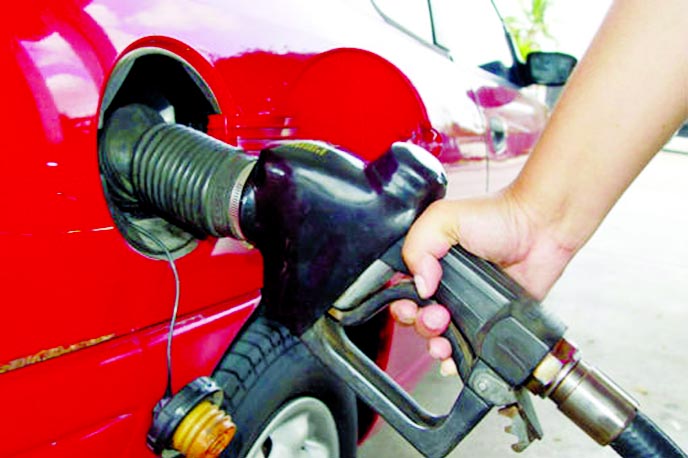
Anisul Islam Noor :
The price of diesel and kerosene decreased finally, but the common people will not get its benefits because of nominal reduction by Tk three per litre. By contrast, that of octane has been reduced by Tk nine only.
In view of the reduction of the diesel price, the bus and the truck fares have been adjusted by Tk0.03 per kilometer, meaning that a passenger will get the benefit of Tk nine if he travels 300 km or more.
Replying to a question, a leader of private transport sector said, does the new rate apply to the public sector transports?
About 60,000 liters of diesel are consumed per day to maintain train service. Tk1.8 lakh will be saved each day for reducing diesel price by Tk three per litre but the railway ministry has no plan to cut fare, the transport leader said.
Farmers also will not be benefited, as the pump owners will not decrease irrigation charge any way. Over nine lakh tonnes of diesel are needed for irrigation pumps and the owners will make a huge profit, but the farmers would be deprived of the impact of reduction, said Professor Shamsul Alam, Adviser of Consumers Associations of Bangladesh (CAB).
The government has reduced petrol and octane price by Tk 10 per litre giving preference to aristocrats who usually use petroleum items. The users of octane would save Tk 1350 crore in a year while Tk 1800 crore in the ease of petrol, Bangladesh Petroleum Corporation (BPC) sources said.
The profit of BPC will be less by Tk 990 crore in case of diesel and Tk 825 crore in case of kerosene annually. But the indirect users will not get benefits from the price reduction.
BPC has earned Tk 30,000 crore since June 2014 after the petroleum price fell in the global markets.
Again, most of the city transports being diesel driven, the passengers of those transports will be hardly benefited. However, the government has a plan to reduce the prices of fuels in three steps and this was the first step.
Even after this recent price cut, currently the government is counting profit of about Tk 17 per litre by selling Diesel and Kerosene and Tk 25 and 20 by selling Octane and Petrol respectively.
The price of fuels has been decreasing globally in the recent years. The price started falling from 128 USD to a record lowest 28 USD or even less per barrel in the global markets in this February.
The price of diesel and kerosene decreased finally, but the common people will not get its benefits because of nominal reduction by Tk three per litre. By contrast, that of octane has been reduced by Tk nine only.
In view of the reduction of the diesel price, the bus and the truck fares have been adjusted by Tk0.03 per kilometer, meaning that a passenger will get the benefit of Tk nine if he travels 300 km or more.
Replying to a question, a leader of private transport sector said, does the new rate apply to the public sector transports?
About 60,000 liters of diesel are consumed per day to maintain train service. Tk1.8 lakh will be saved each day for reducing diesel price by Tk three per litre but the railway ministry has no plan to cut fare, the transport leader said.
Farmers also will not be benefited, as the pump owners will not decrease irrigation charge any way. Over nine lakh tonnes of diesel are needed for irrigation pumps and the owners will make a huge profit, but the farmers would be deprived of the impact of reduction, said Professor Shamsul Alam, Adviser of Consumers Associations of Bangladesh (CAB).
The government has reduced petrol and octane price by Tk 10 per litre giving preference to aristocrats who usually use petroleum items. The users of octane would save Tk 1350 crore in a year while Tk 1800 crore in the ease of petrol, Bangladesh Petroleum Corporation (BPC) sources said.
The profit of BPC will be less by Tk 990 crore in case of diesel and Tk 825 crore in case of kerosene annually. But the indirect users will not get benefits from the price reduction.
BPC has earned Tk 30,000 crore since June 2014 after the petroleum price fell in the global markets.
Again, most of the city transports being diesel driven, the passengers of those transports will be hardly benefited. However, the government has a plan to reduce the prices of fuels in three steps and this was the first step.
Even after this recent price cut, currently the government is counting profit of about Tk 17 per litre by selling Diesel and Kerosene and Tk 25 and 20 by selling Octane and Petrol respectively.
The price of fuels has been decreasing globally in the recent years. The price started falling from 128 USD to a record lowest 28 USD or even less per barrel in the global markets in this February.

